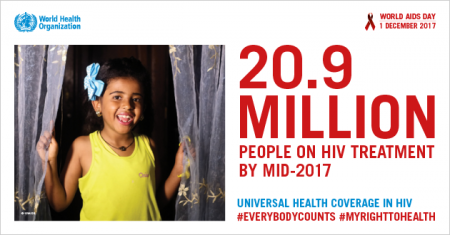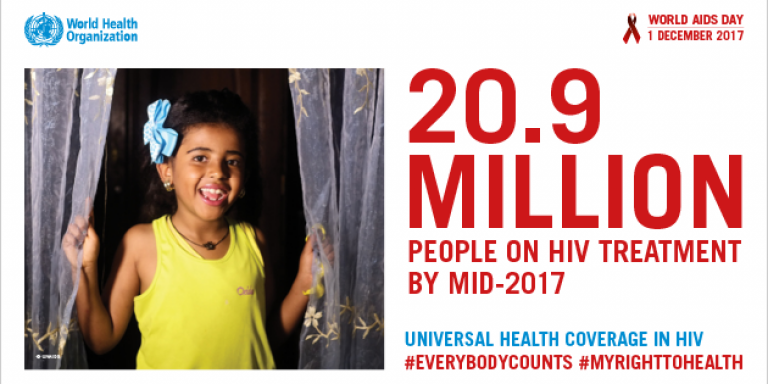World AIDS Day 2017
Everybody counts.

Statement by Dr Tedros Adhanom Ghebreyesus, WHO Director-General
1 December 2017
Since the very beginning of the epidemic, the HIV response has been centred on human rights, equity and communities, the very foundations upon which universal health coverage has been built.
As the HIV epidemic has evolved over the years, it has been the most vulnerable, marginalized communities and individuals that have been disproportionately affected.
As early as the 1980s populations at greatest risk of, and people living with, HIV argued that communities must be at the centre of any response if the threat of HIV is to be overcome.
Soon it became evident that the meaningful involvement of those communities was not only a moral imperative but also constituted good public health practice; public health measures could reach those populations and locations most affected, improve service uptake and efficiencies, achieve equitable coverage and result in greater and more sustained impact.
The HIV response has played a critical role in transforming public health, and in turn has influenced the shaping of the universal health coverage agenda.
We have achieved much in the past 30 years. Today 21 million people are receiving antiretroviral therapy that is enabling them to live full and productive lives. Every day, fewer people are becoming infected with HIV and fewer people are dying. But these successes are masking the many disparities and challenges that persist.
Why, after three decades of recognizing the critical role of communities in driving the HIV response are we still seeing those populations most at risk being left behind, marginalized and discriminated against?
Why is it that men who have sex with men, sex workers, transgender people, people who inject drugs and prisoners, representing 40% of new HIV infections in 2016, continue to be denied the most basic health services?
Why is it that many young women, adolescents, migrants and displaced persons find themselves particularly vulnerable to HIV infection?
And, why is it that adolescent boys and young men do not access the HIV and other health services provided ?
On this World AIDS Day we are here to remind you that “Everybody Counts”!
Everybody counts if we are to achieve universal health coverage and everybody must count if we are to eliminate AIDS and viral hepatitis as public health threats. Health services should be adapted to reach and meet the needs of those populations most at risk and affected, and this includes implementing a ‘zero tolerance’ policy to stigma and discrimination in all health services, and fully engaging communities as equal and essential partners in the response.
It also means that the acceptability and quality of the services must be high, ensuring that people are retained in care and achieve the best possible prevention and treatment outcomes.
Universal health coverage means that all people have access to the services they need, wherever they live, without facing financial hardship. People at risk of and living with HIV usually have multiple health needs, which go far beyond the need to access condoms, sterile needles or antiretroviral therapy.
An effective HIV response embraces integrated people-centred care, in which the full health needs of individuals and communities are addressed, not just those related to HIV. Countries are showing us how HIV interventions and services are being integrated into broader health programmes, how they are being effectively linked to other services, such as those for tuberculosis, viral hepatitis, sexual and reproductive health, non-communicable diseases and substance use disorders. By doing so, health systems are being strengthened and people living with HIV are reaching their full health potential.
Providing the right health services to those who need them, in itself, isn’t enough. If we are to achieve equity, to reach universal health coverage and to ensure the right to health for all, we need to work beyond the health system. The broader policy and social environment continues to play a critical role in shaping HIV epidemics and facilitating or hindering effective responses. The principle of ‘everybody counts’ must be enshrined in policies, laws and practices that span across all relevant sectors, adopting a whole-of-government approach.
The message is simple – make everybody count!























